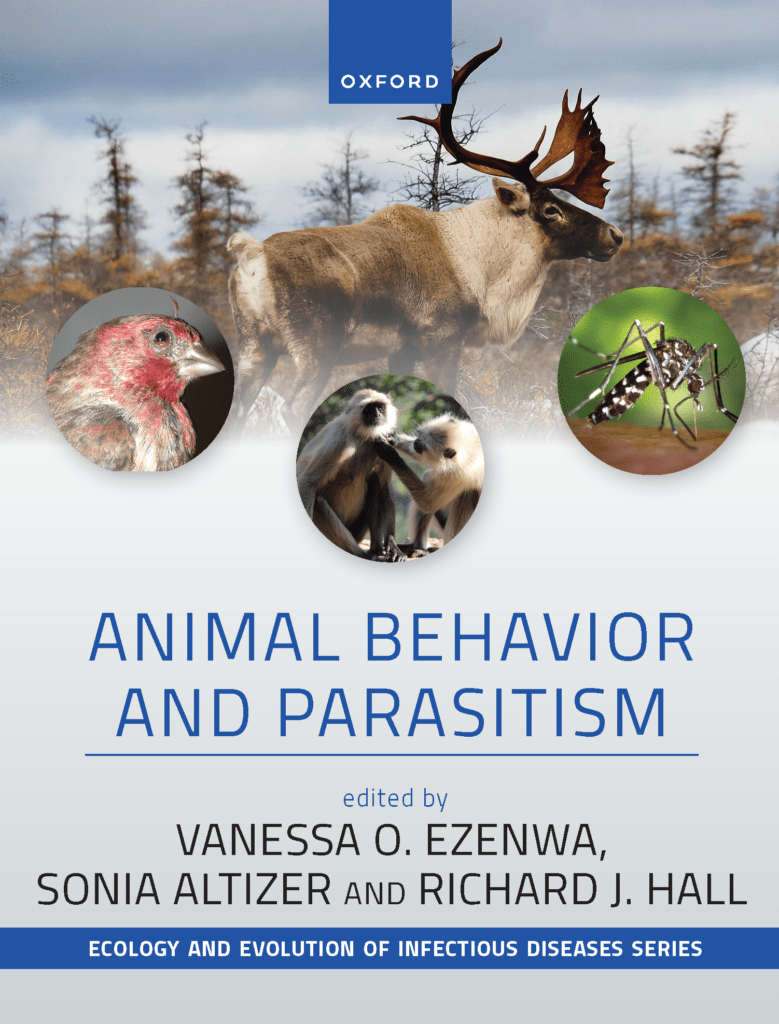The Odum School of Ecology will host a reception Jan. 6 to celebrate Animal Behavior and Parasitism, a new book edited by faculty members Sonia Altizer, Vanessa Ezenwa and Richard Hall. The reception will be held from 4-6 p.m. in the Ecology building’s lobby and courtyard.
Research into the links between parasites and the behavior of animals has burgeoned in recent decades, and the book—sponsored by the Center for the Ecology of Infectious Diseases—was published in November 2022 by the Oxford University Press. It is part of the Ecology and Evolution of Infectious Diseases Series, edited by Regents’ Professor and CEID director John Drake. Many of the chapters began as presentations at the Research Frontiers in Animal Behavior and Parasitism symposium, held as a virtual conference in May 2021.
This book highlights the complicated and often reciprocal interactions between host characteristics, parasite traits and animal behavior. Animal Behavior and Parasitism examines a variety of host organisms (including insects, snails, birds and humans) and types of parasites (bacteria, worms, mites and viruses).
The relationship between animals and the perceived threat of parasites is evolutionarily embedded into the way animals behave. On the other hand, animal behavior determines the transmission and evolution of parasites. For example, when people used social distancing to lessen the spread of the COVID-19 virus, they were protecting themselves from transmission at the individual level. On the flip side, infection by parasites can drive behavioral changes in activity levels, feeding behavior, grooming and movement, with downstream consequences for parasite spread.
Animal Behavior and Parasitism examines five key components of host behavior that influence, or are influenced by, parasites: social behavior, movement behavior, sexual selection and mating behavior, parasite manipulation of host behavior, and behavioral defenses. The book concludes with two chapters authored by early-career researchers on emerging research frontiers: behavior-parasitism linkages across scales from genes to ecosystems, and behavior of the parasites themselves.

The book provides a multifaceted view of the relationship between parasites and animal behavior. With the perspectives of more than 50 authors from 10 different countries represented, book chapters review the current state of key topics in the field, outline new hypotheses, and identify priorities for future research.
“We hope this volume provides an accessible background to central concepts in the field for both beginning and more seasoned researchers,” said Altizer, interim dean and Georgia Athletic Association Professor of Ecology.
Altizer is renowned for her research on monarch butterflies and protozoan parasites. Her groundbreaking research has been published in many academic journals, such as the Journal of Royal Society Interface and the Journal of Animal Ecology. She is the 2018 Lamar Dodd Creative Research Award recipient and has accumulated a variety of teaching and mentoring awards during her time at the University of Georgia.
Ezenwa, adjunct faculty in the Odum School, is a professor of ecology and evolutionary biology at Yale University. She studies host-parasite interactions in wild animals, with an emphasis on linking processes across scales of biological organization. She is president-elect of the Animal Behavior Society.
Hall, who received his Ph.D. from Cambridge University, is an associate professor with a joint appointment in the College of Veterinary Medicine. His research interests include migration ecology and ecological modeling, with a specific focus on urbanization and resources subsidies. His lab provides opportunities for students to learn about infectious disease dynamics.

